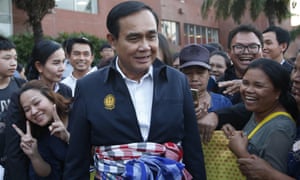Will the pro-junta parties help return Prayut Chan-ocha as prime minister or will the pro-democracy parties win a landslide?
What is happening?
On Sunday 24 March, Thailand will have its first general election in eight years. It will mark the end of five years of military rule after it took power in a bloodless coup in 2014, following months of political turmoil, social unrest and an election that was later ruled void by the constitutional court.
Who are the main players?
Politics in Thailand has been highly polarised for over a decade, and this election is no different.
Rather than handing over power, the junta, known as the National Council for Peace and Order (NCPO), is seeking to continue to govern via the ballot box, and have formed pro-military political parties, such as Phalang Pracharat. It is also seeking the return of the head of the NCPO, Prayut Chan-ocha, as prime minister.
Another key player is the pro-monarchist Democrat party. It has been a junta ally in the past – the Democrats helped usher in the 2014 coup – and many predict they are likely to join a coalition with Phalang Pracharat to create a majority big enough to form a government.
On the other side of the table is the pro-democracy faction, most significantly Pheu Thai party and Future Forward party. Pheu Thai, which has won every election this century, was formed by and is still heavily influenced by exiled former prime minister Thaksin Shinawatra. It is the leading pro-democracy party in Thailand and hugely popular. Even though Thaksin lives in exile in Hong Kong , he still commands huge loyalty and voters still consider a vote for Pheu Thai to be a vote for Thaksin.
Newer to the field is Future Forward, a party formed in March last year. Founded by billionaire businessman Thanathorn Juangroongruangkit, it has one of the most radical and progressive agendas,and has gained huge momentum, particularly among younger voters who are less loyal to Thaksin and see Future Forward as a breath of fresh air.

Does the military have an advantage?
During its five years in power, the military has introduced a series of measures which enshrines their power and skews the election in their favour. In 2016, it drew up a new constitution that gives them the power to appoint all 250 seats in the Senate, the upper house of government.
The new constitution also purposefully prevents another landslide victory by Pheu Thai, and allows for a non-elected figure to be nominated prime minister, laying the ground for the current head of the junta Prayut Chan-ocha to return as prime minister.
What have been the key moments so far?
One of the biggest was the announcement in February by pro-Thaksin party Thai Raksa Chart that it was putting forward the king’s older sister, Princess Ubolratana, as their nominee for prime minister. Thailand’s constitution prevents members of the royal family holding political office but Ubolratana had given up her official titles in 1972. The announcement was greeted joyously in some political circles as a way to finally bridge Thailand’s polarised pro-democracy and pro-monarchy factions. Others, however, saw it as a blurring of the lines between politics and monarchy.
The political fallout was quick and brutal. The king ruled against Ubolratana running and less than a month later the Election Commission forcibly disbanded Thai Raksa Chart.
Will the election be free and fair?
Democracy activists and political analysts agree the election is unlikely to be either free or fair. Thailand is still under the authoritarian junta rules, including article 44 which gives them absolute power, as well as the draconian press censorship and computer crimes laws which prevent any criticism of the junta.
The quick dissolution of Thai Raksa party was seen as a move to eliminate a key pro-democracy party from the race. Thanathorn has also been slapped with multiple criminal charges in an attempt to discredit him and the Future Forward party.
The military has also stepped up intimidation tactics this week, raiding the homes of several opposition MPs and sending soldiers to the meeting of a pro-democracy group Next Steps For Democracy.
Who is likely to win?
The pro-military party Phalang Pracharat is unlikely to gain enough seats to form a majority on its own, even with all the 250 senate seats. Most expect a coalition with parties such as the Democrats, Bhumjaithai and the others. This would pave the way for the return of Prayut as prime minister.
However, their majority is likely to be very small and the coalition fragile, particularly with Pheu Thai and Future Forward providing united opposition in the lower house.
There is always the possibility of a landslide for Pheu Thai,but it is likely the military will do everything it can to prevent the pro-democracy faction taking power.
When will we know?
The election results are unlikely to be clear until days or weeks after 24 March. Officially it doesn’t have to be declared until 8 May.
Either way, the post-election government is likely to be fragile, struggle to pass any legislation and unlikely to last long.
With government at a stalemate, Thailand could be looking at another election not far down the line, or, as has happened so many times before, a military coup to restore order.

